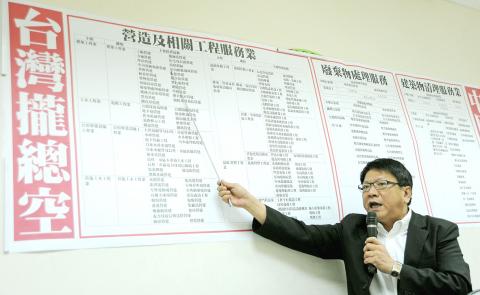Almost half of the respondents to a public opinion poll released yesterday said a trade pact signed by Taiwan and China three years ago has not helped their livelihoods, with a similar proportion saying they do not support the recently signed cross-strait service trade agreement.
The survey was conducted on the eve of the third anniversary of the signing of the Economic Cooperation Framework Agreement (ECFA), which was inked on June 29, 2010, and sought people’s views on the ECFA and the follow-up service trade pact, which was signed on Friday last week in Shanghai.
Asked if the ECFA has improved their financial situation, as the administration of President Ma Ying-jeou (馬英九) has claimed, 48.9 percent of respondents said “no,” while 28.3 percent agreed, and 22.8 percent declined to answer, Taiwan Indicator Survey Research (TISR) said.

Photo: Liu Hsin-de, Taipei Times
With regards to the service trade pact, only 24.9 percent of those polled agreed with the government’s claim that the positive effects would outweigh the negative ones, while 47.4 percent said the downsides would outweigh the positives, and 24.4 percent declined to answer.
Further breakdown of the poll’s results showed that Chinese Nationalist Party (KMT) supporters tended to be more confident about the Ma administration, with 53.9 percent of them believing that benefits from the service trade pact would outweigh the economic damage it could do.
The fear of the impact of an inflow of Chinese investment and workers may have affected the public’s view of the pact as 47.9 percent of respondents said they did not support its signing, 16 percentage points higher than those who said they supported the agreement.
According to TISR, the results are in sharp contrast to a poll conducted in 2010 before the ECFA was signed, when the public support rate for the agreement stood at 47.1 percent, with 33.9 percent against the deal.
The cross-strait service trade agreement should not take effect before being screened by the Legislative Yuan, 64.2 percent of respondents said, while 16.2 percent said the pact should be implemented as soon as possible, and 19.6 percent declined to answer.
The poll, conducted on Tuesday and Wednesday, collected 1,008 valid samples and had a margin of error of 3.1 percentage points.

Taiwanese can file complaints with the Tourism Administration to report travel agencies if their activities caused termination of a person’s citizenship, Mainland Affairs Council Minister Chiu Chui-cheng (邱垂正) said yesterday, after a podcaster highlighted a case in which a person’s citizenship was canceled for receiving a single-use Chinese passport to enter Russia. The council is aware of incidents in which people who signed up through Chinese travel agencies for tours of Russia were told they could obtain Russian visas and fast-track border clearance, Chiu told reporters on the sidelines of an event in Taipei. However, the travel agencies actually applied

New measures aimed at making Taiwan more attractive to foreign professionals came into effect this month, the National Development Council said yesterday. Among the changes, international students at Taiwanese universities would be able to work in Taiwan without a work permit in the two years after they graduate, explainer materials provided by the council said. In addition, foreign nationals who graduated from one of the world’s top 200 universities within the past five years can also apply for a two-year open work permit. Previously, those graduates would have needed to apply for a work permit using point-based criteria or have a Taiwanese company

The Shilin District Prosecutors’ Office yesterday indicted two Taiwanese and issued a wanted notice for Pete Liu (劉作虎), founder of Shenzhen-based smartphone manufacturer OnePlus Technology Co (萬普拉斯科技), for allegedly contravening the Act Governing Relations Between the People of the Taiwan Area and the Mainland Area (臺灣地區與大陸地區人民關係條例) by poaching 70 engineers in Taiwan. Liu allegedly traveled to Taiwan at the end of 2014 and met with a Taiwanese man surnamed Lin (林) to discuss establishing a mobile software research and development (R&D) team in Taiwan, prosecutors said. Without approval from the government, Lin, following Liu’s instructions, recruited more than 70 software

BACK TO WINTER: A strong continental cold air mass would move south on Tuesday next week, bringing colder temperatures to northern and central Taiwan A tropical depression east of the Philippines could soon be upgraded to be the first tropical storm of this year, the Central Weather Administration (CWA) said yesterday, adding that the next cold air mass is forecast to arrive on Monday next week. CWA forecaster Cheng Jie-ren (鄭傑仁) said the first tropical depression of this year is over waters east of the Philippines, about 1,867km southeast of Oluanpi (鵝鑾鼻), and could strengthen into Tropical Storm Nokaen by early today. The system is moving slowly from northwest to north, and is expected to remain east of the Philippines with little chance of affecting Taiwan,